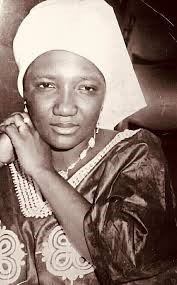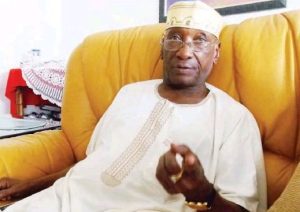What General Abacha Told Me
OpenLife Nigeria reports that Alhaja Aishatu Gidado Idris is the first daughter of late Secretary to the Government of the Federation, SGF, Alhaji Gidado Idris.
In this rare interview, earlier published in the Vanguard, Aisha tells the story of how late Head of State, General Sanni Abacha called her on phone.

Before then, General Abacha and other officers had overthrown her father- in-law, President Shehu Shagari in 1983 by which time she was 23 and had married President Shagari’s first son, Captain Bala Shagari, retd.
But 10 years after, precisely November 17, 1993, General Abacha became the Head of State and Commander-in-Chief, Armed Forces, Federal Republic of Nigeria and made Aiasha’s father, Gidado Idris the Secretary to the Government of the Federation.
About that time, Aisha, due to some irreconcilable crises in the Shagari’s family in Sokoto, had relocated to Dubai and life was tough. It was at that point General Abacha stepped in to rescue her.
Aisha shares her story as a daughter of former SGF, wife of President’s son, and notedly how Abacha helped her survive challenges arising from the collapse of her first marriage:
My name is Aishatu Gidado Idris, I was born in July 9th 1960. I am a writer from a Fulani background of the Gidadawa lineage, with ties to the Mallawa family of Zaria. My great-grandfather migrated from Sokoto to Zaria due to a family disagreement, but we still maintain strong connections with our Sokoto relatives.
Although I left university in my second year while studying law, life has been my greatest teacher. I am a proud mother and grandmother.

As a sociable person, I enjoy meeting people, fostering friendships, and exploring life’s challenges, particularly through social media. I find great fulfillment in relationship counseling and taking on difficult tasks. My friends often describe me as funny and engaging, though I try to remain modest. I deeply value friendship and the people around me.
My hobbies include writing, influencing, and counseling.
I take pride in being my father’s daughter, not because of his high status, but because he was a good and caring man. He personally oversaw my upbringing, teaching me lessons traditionally taught by mothers and guiding me with wisdom I didn’t fully understand at the time.
As his eldest daughter, he gave me special attention—making my box, taking me to the hospital, and visiting me at school. He was so fond of me that his boss, the Sardauna of Sokoto, once requested to see me and even gifted me gold coins.
However, our relationship changed over time, as life took its course.
To those close to him, my father was a sympathetic and generous provider who loved his family deeply, though he often showed tough love. While he was impatient with indecisiveness, he valued honesty and directness. I am proud to have been his first and closest child during those early years.
He was a very hardworking man, since his days as the principal private secretary to Sir Ahmadu Bello, Sardauna of Sokoto.
Personal Experience With Abacha
My father was a professional, and people will hold different views on any government.
However, my personal experience with Abacha has informed me of the kind of person he is. It was an experience of a lifetime.
As a strong-willed daughter, I faced significant challenges with my father over my first marriage. The tension stemmed from the generational gap and our differing views on the expectations of a dutiful daughter.
While my father was an enlightened man, he was also deeply rooted in traditional values.
At the time, I felt he seemed indifferent to the emotional toll my crumbling marriage was taking on me. Being married into a big an extended family in Sokoto came with its own set of complexities.
The situation eventually became so unbearable that I had no choice but to leave. However, my decision had nothing to do with any form of abuse by my husband personally, it was the circumstances surrounding the marriage that made it impossible for me to stay.
To address the issue, I exiled myself to Dubai because I felt alienated by almost everyone. The city wasn’t as big and beautiful as it is today, but it was rapidly developing. My aim was to escape my sorrow and the stigma of being a maverick.
To cut a long story short, to my biggest surprise, news had reached General Sani Abacha about my plight and how I had become stranded and almost helpless in Dubai. Things had gotten so bad for me that the Arabs who knew me jokingly nicknamed me “Aisha miskin,” meaning Aisha the poor lady.
One day, as I was walking in a market, my phone kept ringing. It was a call from the State House. I was tracked down to my location, where I had found shelter with some kindhearted Chadian people who were sympathetic to my situation.
A staff member from the Nigerian Embassy in Kuwait was sent to clear my overstaying issue, which had cost about $20,000. Through all this, God had been listening to my silent prayers, and I finally felt relieved.
It was deeply satisfying to see the same people in the community who had once called me “miskin” now literally lining up to get my phone number and address after realising I was not really a miskin (laughter). It was a funny turnaround. I was received at the airport by staff from the State House and lodged at the Sheraton Hotel in Abuja. I was made comfortable, and all my needs were taken care of.
Soon after, I received a call. The caller introduced himself as Sani Abacha. I wasn’t sure whether to believe him or not, and he laughed heartily at my surprise. He told me to rest and think about when I would come to the Villa to discuss my situation.
Those were days I will never forget in my life. I woke up the next day knowing that God, in His infinite mercy, was handling my case. There was nothing more I could ask for.
The following day, he called again and asked when I would come to see him. I told him “tomorrow.” Three days after my stay at the Sheraton, I was driven to the Villa by State House staff.
I was taken to a sitting room to wait, and I can never forget how he suddenly appeared, dressed in a blue kaftan (tazarce). I was quite nervous and obviously star struck.
He inquired emphatically about my children and laughed as I recounted stories of being duped in Dubai, where crooks had taken advantage of my naivety. He looked at me with deep sympathy.
After I explained my predicament, he told me he wanted to help me, but first, I had to go and apologise to my father for my actions and receive his blessing, without which I cannot succeed he added. He gave me a fatherly lecture, and I spent about an hour with him before departing for my father’s residence.
I went to my father, asked for his forgiveness, and we reconciled. He gifted me some money, and I returned to the hotel.
Soon after, I received another call from General Abacha.
He congratulated me and asked me to lay down plans for what I wanted to do with my future, inviting me to see him when I was ready.
He treated me as though I were his own daughter. I’m still trying to grasp the depth of the lessons God has taught me during that process.
I chose a date to see him, but unfortunately, he called to cancel, saying he was going to receive Yasser Arafat. He promised I could see him the following day.
But that day never came, it was the day he died. This is the Abacha I know. My very own earth angel. He will always be in my prayers.








